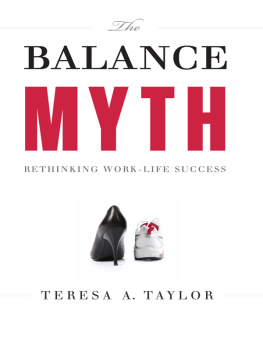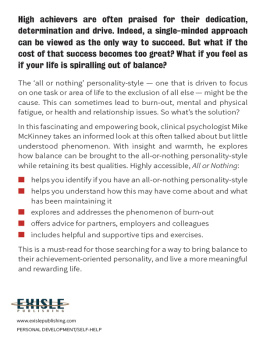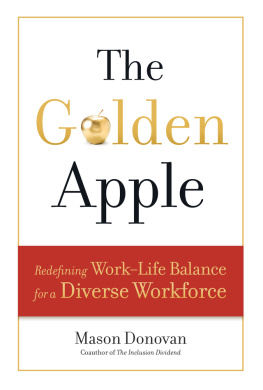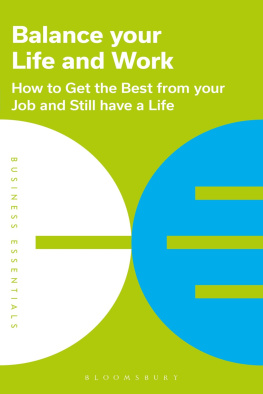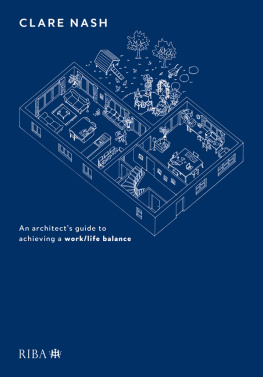ACHIEVING INNER BALANCE
IN ANXIOUS TIMES
Achieving Inner Balance
in Anxious Times
BARBARA KILLINGER, PhD

McGill-Queens University Press 2011
ISBN 978-0-7735-3844-3
Legal deposit first quarter 2011
Bibliothque nationale du Qubec
Printed in Canada on acid-free paper that is 100% ancient forest free (100% post-consumer recycled), processed chlorine free
Second edition of The Balancing Act: Rediscovering Your Feelings, published by Key Porter, 1995.
McGill-Queens University Press acknowledges the support of the Canada Council for the Arts for our publishing program. We also acknowledge the financial support of the Government of Canada through the Canada Book Fund for our publishing activities.
Library and Archives Canada Cataloguing in Publication Data
Killinger, Barbara
Achieving inner balance in anxious times / Barbara Killinger.
Includes bibliographical references and index.
ISBN 978-0-7735-3844-3
1. Peace of mind. 2. Behavior modification. I. Title.
BF637.P3K55 2011 158 C2010-907065-8
Typeset by Jay Tee Graphics Ltd. in 10.5/14 Sabon
Contents
ACHIEVING INNER BALANCE
IN ANXIOUS TIMES
Introduction
Come and find the quiet centre in the crowded life we lead, find the room for hope to enter, find the frame where we are freed: clear the chaos and the clutter, clear our eyes, that we can see all the things that really matter, be at peace, and simply be.
Shirley Erena Murray, Come and Find the Quiet Centre
To find that inner pivotal point of balance, our calm centre of equilibrium, is no easy feat at the best of times. Today, much of our emotional and financial security is still being destabilized by anxious uncertainty. We have been witness to media reports of volatile stocks markets, the threat of major bank collapses, massive fraud schemes, and widespread corporate control of our media, government, and institutions of learning. People who suffer from addictions, depression, obsessions, and other psychiatric disorders know anxiety all too well. It is ever present.
Some of the cultural and societal forces that affect whether or not our experience of the world is well balanced are relatively recent phenomena, while others, like shifting educational values, have evolved gradually over time.
Todays timesickness is increasingly problematic. In Marshall McLuhan, Douglas Coupland s book about the media guru, the author states his belief that the texture of daily life in Western media societies changed around 2003 due to the lack of tolerance for waiting of any sort, a need to have all the facts now or suffer a meltdown, and a fear of becoming irrelevant if one slows down, even once. The new us is part of an online phantom world of information where geography is unimportant, and yet, Coupland adds, this complex web of data and people who support us is tenuous and fleeting. Time speeds up and then it begins to shrink. Years pass by in minutes (15).
Our shortened attention spans drift easily away as our focus shifts. We become perpetually distracted, and multitasking blurs clarity. As you will learn in these pages, stressful situations result when this inattention is coupled with the negative side of Intuition, with its restless impatience, poor impulse control, and poor judgment. This dynamic prevails as obsessional Thinking comes to dominate our psyche and Feeling, Intuition, and Sensation functions are repressed and turn to their dark side.
When the emphasis in education is placed on practical science and market-driven economic growth rather than the humanities and liberal arts, there are serious consequences for society. Pulitzer Prize winner Chris Hedges warns that the balance of power and control has tipped towards educating students in specialized narrow skills that provide training for a chosen career path, rather than furthering the universitys true purpose of educating the mind to ask the broad, universal questions. In his 2009 book, Empire of Illusion. The End of Literacy and the Triumph of Spectacle, he blames the bankruptcy of the economic and political systems in the United States on diminishing enrolment and a lack of exposure to the humanities, which have seen a fifty percent decrease in enrolment since the 1960s.
Hedges states that to train students to debate stoic, existential, theological, and humanistic ways of grappling with reality is to educate them in values and morality (103). Further, he says, a culture is doomed if it fails to grasp the interplay between morality and power because it mistakes management techniques for wisdom and does not understand that compassion is the true measure of a civilization. Without the clear thinking that is necessary to recognize personal biases and the inadequacies in economic, social, and political structures, no major modifications can take place.
In Canada, funding for the new $200-million Canada Excellence Research Chairs, as an example, overwhelmingly favours the sciences. Yet the humanities, viewed from a broader perspective, benefit our society in vital ways.
The teaching of the humanities plays an important role in preserving democracy, says philosopher Martha Nussbaum, author of For Profit: Why Democracy Needs the Humanities. She stresses that the ability to think critically, to argue right and wrong, and to play our role in a democratic society depends on a greater understanding of the world, its different groups of people, their histories, and the way they interact. John Allemangs conversation with Nussbaum, reported in his Globe and Mail article crit.ic.al think.ing, includes an interesting summation of critical thinking. It is described as the intellectually disciplined process of actively and skillfully conceptualizing, applying, analyzing, synthesizing, and/or evaluating information gathered from, or generated by, observation, experience, reflection, reasoning, or communication, as a guide to belief and action. In its exemplary form, it is based on universal intellectual values that transcend subject matter divisions: clarity, accuracy, precision, consistency, relevance, sound evidence, good reasons, breadth, and fairness.
Critical thinking, as you will discover, is crucial for the balanced point of view inherent in a technique I developed called Internalizing. As you read these pages, you will learn how to analyze your reaction in response to a situation or person in order to be aware of what you think, and then to examine how and why you know that. In addition, you will learn to get in touch with how you feel about a subject or conversation and to discern exactly what it is in that situation that is causing you to react a certain way. Sometimes it is appropriate to talk about your own needs as well. You can then communicate this information, or your position as I call it, to those involved. Ideally, you want to be one hundred percent responsible for your own reactions in any given situation.
The pervasive evolution of ever more sophisticated, life-changing technology is another external but present threat to our ability to live a balanced life. It is easy to be seduced by its all-encompassing scope of useful information and far-reaching transformational ways of doing business. The danger lies in the inclination of some individuals to become obsessed with technology and a slave to its use. The lure of getting from idea A to goal B faster and smarter through technological wizardry is highly seductive.
Unfortunately, obsessions eventually take control of the individual, not vice versa. An obsession is narrowly focused thinking that becomes fixated on an idea, goal, object, or person. The individuals relentless, often irrational thoughts and impulsive behaviour together fuel compulsive drives that lack intuitions big picture wisdom and limit problem-solving expertise.
Next page

